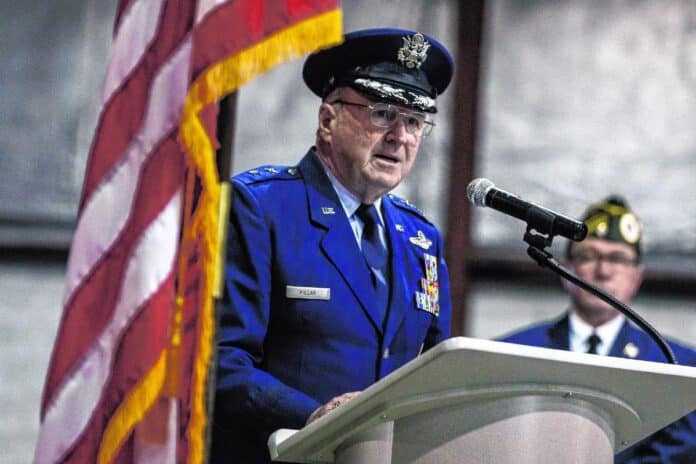
INDIANAPOLIS — A bill that sparked strong debate about who should be eligible for emergency services to help former military personnel has passed both houses of the General Assembly, and is expected to be sent to Indiana Gov. Eric Holcomb for his signature.
Senate Bill 316, authored by Sen. Chris Garten, R-Sullivan, will expand the number of veterans eligible to receive benefits from the $3.75 million Military Family Relief Fund, which receives revenue from donations and the sale of “Support Our Troops” license plates. The maximum benefit is $2,500 to pay rent, electric bills and mortgage payments during emergencies.
Those dishonorably discharged from the military will remain ineligible for help under the bill’s regulations.
The bill has set off controversy among some of Indiana’s estimated 550,000 veterans because the fund could be used to provide benefits to those with “Bad Conduct” and “Other Than Honorable” discharges, said retired U.S. Air Force General Mark Pillar, Columbus.
“It’s a very emotional and very controversial matter because you have veterans groups that are absolutely for it – and you have veteran groups who are against it because they feel it diminishes their status,” Pillar said.
On Feb. 16, the bill passed the Senate 46-0, and the House approved the legislation 90-3 on March 31. The bill was sent back to the Senate without any amendments. This week, the bill was signed by Senate President Pro Tem Rodric Bray, R-Martinsville and House Speaker Todd Huston, R-Fishers.
Supporters of the bill include the Veterans of Foreign Wars, American Legion, and American Veterans Aid, Pillar said. In contrast, he said American Veterans (AMVETS), Reserve Organization of America, and the Military Officers Association of America oppose the legislation.
Generally speaking, “Other Than Honorable” discharges are the most severe of the administrative discharges that do not require a court-martial. These type of allegations might include security violations, the use of violence and a conviction in a civilian court.
A “Bad Conduct” discharge usually comes as the result of a court-martial and may be followed by prison time, depending on the nature and severity of the conduct.
Describing himself as “usually a social softie on helping people,” former U.S. Marine Zack Ellison of Columbus said most people with a “Other than Honorable” or “Bad Conduct” discharge did serve most of their time under honorable conditions, but somehow got in trouble – probably when they were away from their base. Everyone makes mistakes when they are 18 or 19 years old, Ellison said.
But the Cummins Inc. retiree says he thinks the bill lowers standards and provides rewards for people with less-than-honorable discharge. That’s a key reason why Ellison is not in favor of the bill.
“But after doing research and finding out what type of impact the bill would have on the amount of (available) money, I could change my mind,” Ellison said.
Traditionally, the largest veteran groups would not take less than honorable discharged veterans, but that has changed as these organizations need more members to sustain operations, Ellison said. In addition, Army veteran Roger Williams said the bill’s passage will open up avenues that will provide additional money to the Military Family Relief Fund.
Vietnam War veteran and well-known Columbus architect Nolan Bingham said he can’t prove a definitive connection between his pancreatic cancer and his service in Vietnam, but he walked through fields treated with Agent Orange, the defoliant used to clear heavy brush there. Several studies have found an increased risk of pancreatic cancer in Vietnam war veterans.
“I look at what happened to me, or what happened to many other veterans, as a problem the government created for us,” Bingham said. “But the dishonored veteran created his own problems.”
When people purchase “Support Our Troops” license plates, they believe they are assisting men and women who honorably served their country in the military, Bingham said. But if their money is also helping those with “Bad Conduct” and “Other than Honorable” discharges, the public might think they are being fooled.
“I’m afraid we will get into a situation where people who purchase (Support Our Troops) license plates will no longer see it as important, and back away,” Bingham said.
Bingham and Ellison said that veterans who don’t have an honorable discharge can still seek assistance through social service agencies and charities.
While Pillar said he believes in assisting veterans, the retired general feels veteran entitlements have to be earned.
“You sign a contract to serve your country, knowing you could be giving your life to defend the U.S. Constitution,” Pillar said. “But this is a self-inflicted wound. And if you do something that disqualifies you, that whole contract goes out the door.”
In addition, some who received “Other than Honorable” discharges obtained them through a plea bargain to avoid a court martial, Pillar said.
“It’s sort of like a plea agreement,” Pillar said. “They will agree not to court-martial you if you accept the agreement and admit what you did.” As a result, the offense may be far more severe than what is cited in the agreement, he said.
Another part of the proposed bill that bothers a number of veterans, including Pillar, is that the legislation allows the Department of Veteran Affairs to use up to 10% of the average annual license plate revenue to cover direct costs associated with the marketing and promotion of the military relief fund.
For this year, that’s $210,000 in Indiana, which Pillar said is too much for marketing. Another major objection voiced by the retired general is that marketing “spends money in a way that the donor was not intending to do.”
Bartholomew Superior 1 Judge James Worton leads the Veterans Treatment Court, a program providing offenders who are former military personnel with assistance to rebuild their lives.
As a judge, Worton is prohibited from giving his opinion on any pending law. But he does say there is no official definition of “veteran” in his courtroom, and the admittance of “Bad Conduct” and “Other Than Honorable” discharged veterans into the program is considered on a case-by-case basis.
While Ellison said some veterans may take a hard line and say nobody should get help if not honorably discharged, Worton provides a different perspective.
The goal of helping troubled veterans is done to better society as a whole, so it benefits the entire community to provide them with help and treatment, the judge said.
“If they signed on the dotted line and served our country, we’re going to give them a good look to see if they are appropriate for our program,” Worton said.
The judge said it’s also important to note that discharge statuses can be changed by the Veterans Administration under certain circumstances.
[sc:pullout-title pullout-title=”To learn more” ][sc:pullout-text-begin]
For more information about license plates that support the military, visit:
https://www.in.gov/bmv/registration-plates/license-plates-overview/indiana-military-license-plates/
[sc:pullout-text-end]




